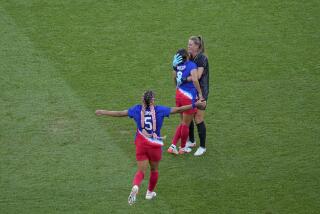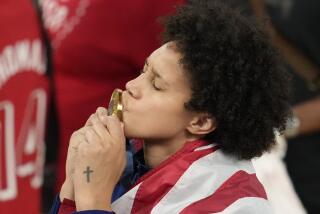U.S. Saves Best for Last
SYDNEY, Australia — The soil underneath was Australian, but not the court.
That belonged to the American women.
Their gold-medal showdown with Australia drew Brandi Chastain and the U.S. women’s soccer team, Alonzo Mourning, Kevin Garnett and the U.S. men’s basketball team and such Australian icons as Dawn Fraser and Andrew Gaze.
What they witnessed was an extraordinary performance by the U.S. against a team that had every right to think it could give the Americans a game, but instead stood a notch below them on the medal stand after the U.S. took the gold with a 76-54 victory Saturday in front of 14,978 at the SuperDome.
It was a grand scene, and easily the best game the U.S. played in these Olympics.
Sheryl Swoopes dazzled on the fastbreak, and Teresa Edwards made passes that made you yearn for her to return for a sixth Olympics at 40.
Lisa Leslie dueled Lauren Jackson and won, and Natalie Williams and Yolanda Griffith banged away inside.
“They were too good and too powerful,” Australian Coach Tom Maher said.
“Yeah, ditto. They were exceptional,” guard Michele Timms said. “That was the U.S. at their best.”
The American women laughed and danced and paraded in the flags Mourning and Vince Carter gave them.
But after the teams left the court, Edwards came back for a last look after winning her fourth and final gold medal at 36.
“I was walking around kind of hazy for a minute,” Edwards said.
“I kind of just decided I wanted to be the last one to walk off the court if I could. I looked around, and everyone was gone.”
Edwards took a seat.
“Right in the middle. Jump ball,” she said. “I just remembered the days when nobody knew who I was in my hometown. The coaches would let me in the gym, and I’d be there by myself with the lights on or the lights off, shooting in the dark sometimes.
“And I’d get tired, and sit on the floor. And after I rested I’d get up and do a little more and go home.
“Then I think someone told Dawn Staley that I was losing my mind out there and she ran out to get me.”
Edwards was the emotional tug after what she said was the end of her brilliant career.
“You know, she keeps saying it’s her last time, but you never know,” Staley said. “She makes it look so easy, you never know if we’re going to see her again.”
There was another story at every turn.
There were the U.S. women, whose 1996 victory on their home soil in Atlanta spurred two professional leagues, and meant that this time they would have to win without touring together for a year beforehand because they instead played the WNBA season.
“This one was hard,” Leslie said. “Working six months before the WNBA season, shortening the WNBA season, I’m ready to go home.”
Leslie also said it will be her final Olympics.
“Where is it in four years? Athens? Nah.”
There was Swoopes, who in little more than a month has won a WNBA title and an Olympic gold medal.
“But I don’t think anyone thought we’d win by 22,” said Swoopes, who also played on the ’96 team.
This time the U.S. won on the road, so to speak, defying a confident Australian team and a young star in Jackson who still wasn’t chastened after a loss in which she scored 20 points and had 13 rebounds but made six of 17 shots.
“The Americans are great, they are an awesome team,” said Jackson, 19, projected to be a future No. 1 WNBA draft pick.
“But we can beat them, I still think we can beat them.”
Australia was hurt by the loss of point guard Kristi Harrower, who suffered an ankle injury in the first five minutes of the second half and couldn’t continue, a blow to the Australians’ hopes.
“If you kept up with the papers and this Australian girls’ team--women’s team, I’m sorry--you would have thought they’d already won it,” Edwards said.
“There was pressure because I felt like they had the momentum and they do have a good team that I respect. And they had been working a long time together. We did that in ‘96, and it proved to work for us.”
So much has changed since ‘96, especially for Williams, the former UCLA volleyball and basketball star who was one of the final cuts from the Olympic volleyball team before Atlanta.
Williams, a WNBA all-star for the Utah Starzz, came off the bench Saturday and was a force for the second game in a row, turning back an Australia counterattack in the second half with steals and offensive rebounds in a 15-point, nine-rebound performance.
“That was key, her accepting her role,” said Coach Nell Fortner, an assistant to Tara VanDerveer in 1996 who guided the team to a second consecutive gold herself.
“Natalie is a tough, tough player and a tough competitor. She had a goal to win a gold medal, and that overrode everything that could have stood in her way.”
Leslie also had 15 points and nine rebounds, and Griffith, who went into the stands to hug her daughter when the game ended, had 13 points and 12 rebounds.
Another player, Chamique Holdsclaw, goes home with a medal but never played because of a foot injury.
“We got up on the medal stand and they were like, ‘Jump down,’ ” Holdsclaw said. “And I was like, ‘Someone help me, please.’ ”
She’ll probably be back.
Not Edwards.
“ ‘T’ has been our constant,” Staley said.
No more, Edwards said.
“Don’t tell me I’m going to play again,” she said.
“I did cry. When I was walking off the court the last time.”
(BEGIN TEXT OF INFOBOX / INFOGRAPHIC)
Medal Winners
Women’s Basketball
Gold: United States
Silver: Australia
Bronze: Brazil
More to Read
Go beyond the scoreboard
Get the latest on L.A.'s teams in the daily Sports Report newsletter.
You may occasionally receive promotional content from the Los Angeles Times.






